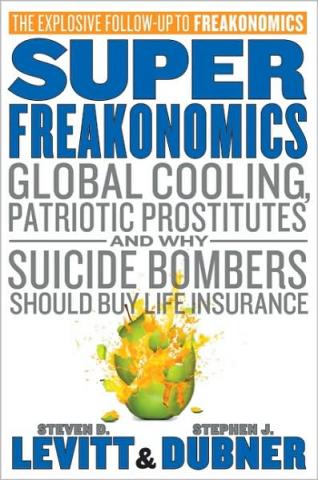At the risk of piling on, we’d like to add our voice to those who are disappointed by the clumsy unprofessionalism of Steven Levitt and Stephen Dubner’s new book, SuperFreakonomics – at least in regard to its handling of climate change.
Assuming that Levitt and Dubner’s foray into disinformation was accidental rather than intentional, I would speculate that there are two reasons why the authors bungled this section. First, they made a popular assumption that because someone is smart about one thing, they are smart about everything. Second, they were happy to get their information from people who were basing their opinions more on their world view than on the careful calculations of actual science.
If you are interested in the specific factual weaknesses in SuperFreakonomics, you can get a long version from Joe Romm at RealProgress or a shorter, but equally devastating dissection from Tim Lambert at Deltoid. (I especially like the clarity of Tim’s headline: “Why Everything in SuperFreakonomics about Global Warming is Wrong.”)
For the defensive, but ultimately unconvincing response from Dubner, you can check out the SuperFreakonomics blog on the New York Times site.
But let’s look at the smart guys. Levitt and Dubner went for their climate change lesson to Nathan Myhrvold, a former Microsoft software architect about whom Bill Gates us reported to have said, “I don’t know anyone I would say is smarter than Nathan.” Pretty impressive.
Myhrvold’s mentor is the “spectacularly talkative astrophysicist” Lowell Wood, of whom Levitt and Dubner report: “Myhrvold thinks Wood is one of the smartest men in the universe.” Fabulous.
L&D continue, “Off the top of his head, Wood seems to know quite a bit about practically anything: the melt rate of Greenland’s ice core (80 cubic kilometers per year); the percentage of unsanctioned Chinese power plants that went online in the previous year (about 20 per cent); the number of times metastatic cancer cells travel through the bloodstream before they land (“as many as a million”).”
Here we start running into the real trouble. First, just because someone is good at Trivial Pursuit doesn’t mean they’ll be a reliable scientist, especially if they presume to work in fields outside their area of expertise. Second, having a confident grasp of interesting bits of science is so much more impressive when what you are saying is actually correct.
I don’t know much about metastatic cancer or unlicensed Chinese power plants, but according to the latest paper in Geophysical Research Letters, the melt rate of ice in Greenland’s core has risen from 137 cubic kilometres in 2002-2003 to 286 cubic kilometres – per year – in 2007-2009. Wood is either no longer good with numbers (he’s 65; it happens to us all), or he’s a decade or more out of date. Either way, he’s just not that credible.
This, however, doesn’t stop him from offering enthusiastic answers to a bunch of other questions on which his knowledge seems, at best, shaky and, at worst, agenda-driven to the point of dishonesty. For example, when condemning the entire community of climate modellers, he says that they dishonestly manipulate their results in order to increase their chances to get research funding. (“Everybody turns their knobs” – that is, adjusts the control parameters and coefficients of their models – “so they aren’t the outlier, becuase the outlying model is going to have difficulty getting funded.”) If he has evidence of this, he should report it. If not, he should apologize.
This is a favourite denier talking point, as are some of Wood’s other bromides like the alleged scientific failure to take water vapour into account. It’s the kind of blather that superannuated old contrarians (stand up Feeman Dyson) spout in order to entertain themselves at dinner – in which context this could all be interesting and fun. But Levitt and Dubner, without working quite hard enough to check the facts, offer it all up as worthy material on which to rest international policy. Not.
For anyone interested in reading more about Wood and his longstanding enthusiasm for geoengineering, there is a great Rolling Stone piece by Jeff Goodell (I presume the same Jeff Goodell who wrote the excellent book, Big Coal). It turns out that Wood is a proud Cold Warrior, one of the “brains” behind Rongal Reagan’s failed – but so interesting – Star Wars plan. It turns out that Wood has been wanting to loft dangerous things into the stratosphere for a long time.
For anyone interested in reading more about climate change, there are many credible sources – scientists who actuall study in the field or, perhaps even better, the Intergovernmental Panel on Climate Change, a body whose Nobel prize winning work is also sometimes out of date, but never quite so dramatically as Lowell Wood’s.
As for the Freakonomics guys, I loved their first book and I suspect, now that I have finished with the flawed fifth chapter of this one that I will enjoy the rest. Unfortunately, given the casual sloppiness of Chapter 5, I just won’t be able to take much of it very seriously.
Subscribe to our newsletter
Stay up to date with DeSmog news and alerts






